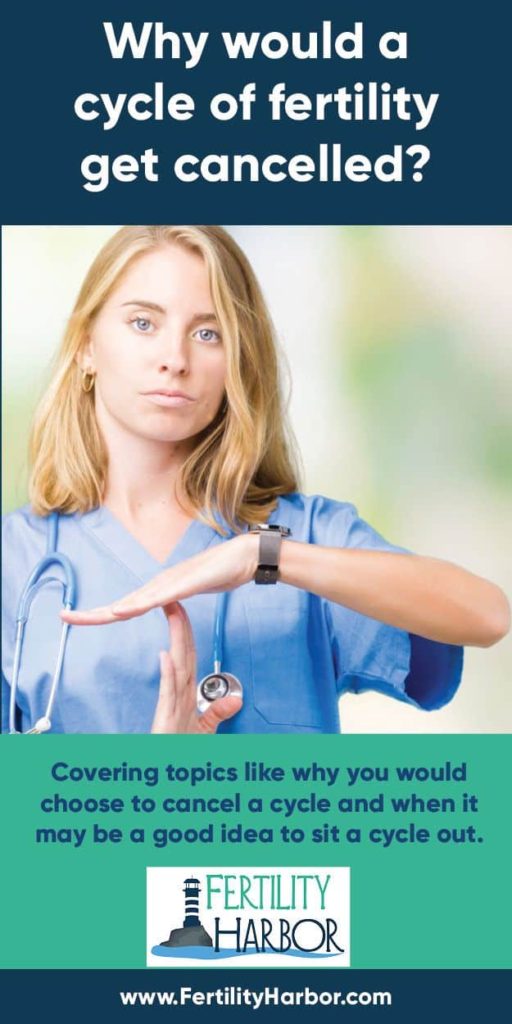When you’re trying to get pregnant, you spend a lot of time dreading your next period and/ or another negative pregnancy test. But there’s another form of bad news that you may not be prepared for: a cancelled cycle.
Cancelling a fertility cycle means that you don’t go forward with whatever you were planning to do to get pregnant (IUI, IVF, etc.). You just wait until you get your period and you can start another cycle.
Different doctors may use different guidelines for cancelling, but the underlying reason is the same: the cycle is unlikely to be successful.
The more complex and intensive your treatment is, the more opportunities there are to cancel a cycle. Let’s start with the simplest kind of fertility treatment: ovarian stimulation with or without an IUI.
Reasons to Cancel a Medicated Fertility Cycle (Not IVF)
You had residual follicles from the previous cycle.
Doctors will usually want you to go in for an ultrasound sometime CD 1-3 to confirm that everything is clear. If you have residual follicles left over from the last cycle, you probably have to hold off on this cycle and wait for the residual follicles to go away.
I thought these early scans were just a formality until my baseline scan showed a 50 mm follicle. That thing looked like the Death Star on the ultrasound monitor! I couldn’t believe it.
It disappeared on its own, but I had to take a whole month off from treatment. I was told that if we went ahead with another round of injections, that one mega-follicle would suck up all the medication and keep growing.
You didn’t produce mature follicles in the appropriate time frame.
Most doctors will want to see at least one follicle in the 18-20 mm range when you trigger ovulation, and they generally want you to trigger sometime around CD 14. You should have one dominant follicle around 12 mm on CD 10, since follicles typically grow a millimeter or two every day.
You can certainly get pregnant from a late ovulation, but the egg quality can sometimes suffer.If you go in for multiple scans and your follicles just aren’t growing, that may be a reason to cancel.
You may need a higher dose of medication next time, or a different medication altogether. For example, you may not respond at all to Clomid, but ovulate like a champ on Femara (or vice versa).
Don’t worry if some of your follicles stop growing or shrink as you go through the first part of the cycle. That’s part of the normal process of ovulation — you wouldn’t want every follicle you have to mature and ovulate!
The important thing is that you have one or two dominant follicles that are still growing “appropriately.”
If you have moved on to injectables and it seems like your lead follicles are stalling out, you may just need to increase the dose or keep doing the injections for a few more days to get those stubborn follicles back in the game. Those injections are powerful, so don’t give up too soon!
Your endometrial lining was too thin to support implantation.
Your ultrasound tech will measure the thickness of your uterine lining as part of your ultrasound. The uterine lining builds during the first half of the cycle, creating a nice comfy environment for the fertilized egg to burrow into.
Most doctors want to see a uterine lining of at least 7 or 8 mm when you trigger. Women have definitely gotten pregnant with linings thinner than that, but the odds are lower. If your lining is really thin, your doctor may encourage you to cancel.
For whatever reason, my lining sometimes got thinner instead of thicker in the first half of my cycle. Once that pattern was identified, my doctor added estrogen supplements to my protocol. I got pregnant with my twins the very first time I had a uterine lining of 10 mm. Obviously I’m a big believer in the power of a nice thick uterine lining!
For more info about this issue, including what you can do to get a thicker lining next time, see the post Can You Get Pregnant With a 5 mm Endometrial Lining?
You responded too well.
Your doctor will encourage you to cancel an IUI/ TI cycle with “too many” mature follicles. For some doctors and patients, that’s 3. For others, it may be 4. It depends on your age, your medical history, your doctor’s experience, and your openness to a multiples pregnancy.
(See Will Clomid Make You Have Twins? for more information about the possibility of conceiving twins or more with fertility medications.)
Ovarian hyperstimulation syndrome (OHSS) is rare, but it can happen when you over-respond to fertility meds. Obviously, if you develop OHSS or any other serious complication from your treatment, you should cancel the cycle.
The timing didn’t work out.
Sometimes, despite everyone’s best efforts, the timing just doesn’t work out. For example, your follicles may have grown too fast and your body ovulated on its own. (Ovulating too soon is not usually a problem with IVF, because patients are given injections to keep that from happening.)
Or maybe you responded more slowly than you anticipated, and your IUI now falls on a day you have to be out of town at a work conference. Bummer!
Reasons to Cancel an IVF Cycle
You didn’t get enough mature follicles for the retrieval procedure.
With IVF, you want a lot of follicles because you have control over the number of embryos that are implanted in the end. Your clinic probably has a minimum number of mature follicles for moving forward, and it will be higher than the number you’d want for an IUI/ TI cycle.
For example, your doctor may want to see at least 5 maturing follicles for an IVF cycle. Having that many follicles increases the chance that you will have at least one high-quality embryo to transfer.
You had mature follicles, but when they did the retrieval, you didn’t have enough good-quality eggs.
You would think that the number of mature follicles on the ultrasound will be the same as the number of eggs retrieved, but that’s not necessarily the case. Sometimes the egg inside the follicle isn’t ready, or it’s actually an ovarian cyst. An ultrasound can only show so much, unfortunately. Eggs are much smaller than the follicles that house them.
You had enough good-quality eggs, but not enough of them fertilized and continued to grow normally.
Your doctor needs at least one high-quality embryo to transfer if you are going to achieve a successful pregnancy. Sometimes, despite everything looking good until this point, the blastocysts just don’t make it to become viable embryos.
Plenty of fertilized eggs just aren’t strong or healthy enough to become babies. That’s totally normal — we just wouldn’t be aware of it happening without procedures like IVF.
There were red flags in your blood work.
Your doctor will likely order various kinds of lab tests as you go through the IVF process. For example, if your estrogen levels are ridiculously high, your doctor may cancel the cycle due to the fear of ovarian hyperstimulation syndrome (OHSS).
The timing didn’t work out.
Pregnancy is all about timing. IVF has a lot of steps, and you need to be available and healthy for all of them. For example, you may have to cancel if you’re unlucky enough to get the flu when your egg retrieval was scheduled.
For more info about the potential impact of illness on IVF, see Should You Do a FET If You’re Sick?
Genetic testing showed serious problems.
Screening for genetic abnormalities helps doctors ensure that only healthy embryos make it to the transfer stage of the process. There are two basic types of genetic testing, and both are optional:
- Pre-implantation genetic screening (PGS) checks for genetic abnormalities such as aneuploidy (too few or too many chromosomes). Down Syndrome is one of the most common forms of aneuploidy, but many forms are severe enough to make the pregnancy non-viable.
Pre-implantation genetic diagnosis (PGD) checks for specific genetic conditions that are known to run in the family, such as cystic fibrosis and muscular dystrophy.Both PGS and PGD are expensive add-ons to the already expensive IVF process.
These tests are more of a priority for older women (due to the higher risk for chromosomal issues), women with a history of failed IVF or recurrent pregnancy loss, couples with unexplained infertility, and couples with a family history of genetic diseases.
Sometimes the results of these tests can lead couples to pursue IVF with donor eggs and/ or donor sperm instead of their own, to increase the odds of success.
Changing the Plan

If you are going to a full-service fertility clinic, you and your doctor may decide to change the plan midway through. For example:
Converting From IUI to IVF
This is often suggested when there is a high number of developing follicles during a stimulation cycle. Overall, IVF has a higher success rate than IUI, and results in fewer multiples pregnancies.
So if you have six or seven mature follicles, it might make more sense to convert to IVF rather than cancel the whole cycle and start again next month (probably with less powerful meds or lower doses).
Converting From IVF to IUI
This is often suggested when there is a low number of developing follicles during the early stages of an IVF cycle. (This is unlikely to be effective if there are male-factor infertility issues, though.) IUIs have a lower success rate, but they are also much less expensive than IVF.
One important consideration is whether you are likely to develop more mature follicles on a different stimulation protocol. For example, women with diminished ovarian reserve (DOR) don’t produce many mature follicles even on high doses of injectable hormones.
In that case, it might be worth going forward with IVF anyway, to make the best possible use of those precious eggs.
Freezing Embryos Instead of Transferring Them
Women with high progesterone during the IVF process may be better off freezing embryos for a future cycle rather than transferring them in that cycle.
That is because high progesterone is associated with lower rates of implantation and live births.
Reasons to Take a Cycle (or More) Off From Fertility Treatment
You just need a break.
Doing round after round of fertility treatment can be depressing, exhausting, and expensive. Lots of couples take a break from the roller coaster for a month or more to regroup.
Some women decide to work on other health factors, such as getting closer to their goal weight or starting counseling, before trying again. Others need time to grieve and process. Whatever you need to do for your mental and physical health, do it!
For more tips on keeping your relationship strong during fertility treatment, read my post Does infertility Raise Your Odds of Divorce? My post TTC Naturally After Failed IVF has some good info for those looking to take a break from fertility treatment or stop altogether.
You know that you and/ or your partner will be out of town during important phases of the treatment.
Sometimes you can see a timing issue well in advance, and you know you have to skip the entire cycle. Business trips, out-of-town weddings, and family obligations can mess with your treatment schedule.
For tips on traveling with fertility medications, see my post Why Are So Many Fertility Medications Refrigerated?
You are considering changing doctors or clinics.
Maybe you started with an OB and you’re considering switching to an RE at a fertility clinic. Or maybe you’re just not happy with how the last cycle(s) went, or you’re frustrated with your doctor’s approach or communication style.
If you have any doubts at all, you should absolutely get a second opinion. You deserve to be 100% confident in your fertility team. Don’t settle for less!
Conclusion
Whatever the reason for your cancelled cycle, try to think of it as a learning process. In order to find out what works for you, you have to find out what doesn’t work.
You now have valuable data to inform your next treatment plan, whether you’re trying again next month or taking a break. As always, I wish you the best of luck!

This post was last updated in March 2025. Most of its content was written in 2020.



 I’m Jenn! Here I am with my beautiful twin boys. My pregnancy was possible thanks to fertility treatment for PCOS.
I’m Jenn! Here I am with my beautiful twin boys. My pregnancy was possible thanks to fertility treatment for PCOS.


